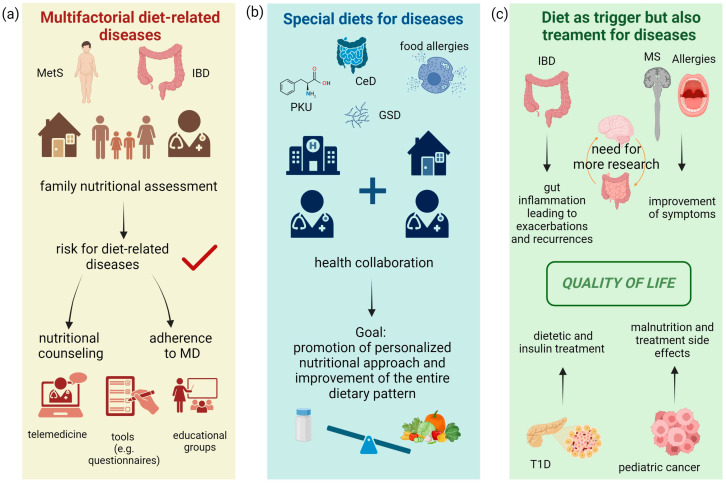Figure 4.
Considerations for diseases’ management and the impact of nutrition. (a) The first flow chart shows diet-related diseases. In obesity, there is confirmed evidence in the pediatric setting, and in IBD only in the adult setting. Prevention of these pathologies should start locally, with the family pediatrician evaluating the dietary habits of the family and assessing the presence of risk factors for obesity or IBD. If the risk is confirmed, a tailored intervention to promote the Mediterranean diet should be addressed to the whole family, in collaboration with a nutrition professional, and supporting lifestyle changes with the help of telemedicine tools, educational peer groups, and the administration of Mediterranean diet adherence questionnaires. (b) For diseases requiring a special diet (food allergies, CeD, PKU, and GSD), the treatment setting is the hospital, but there must be close collaboration with the family pediatrician. The dietetic nutritional goal is not only the control of the disease itself but the promotion of healthy eating habits through personalized interventions. (c) For IBD, multiple sclerosis, T1D, allergies, and cancer, the pro-inflammatory potential of dietary habits during the onset of the disease has been demonstrated in studies on children and adults. After diagnosis, diet also plays an important role in disease management. For IBD, pro-inflammatory dietary habits impact gut inflammation and thus the frequency and intensity of recurrences. There is little evidence for MS and allergies but correct dietary habits could influence symptom control. The gut–brain axis in MS should still be explored. In T1D, the proper management of insulin therapy depends strongly on the patient’s dietary habits. Finally, even for some types of cancer, compliance with nutritional therapy determines the prevention of the risk of malnutrition and the proper management of therapies’ side effects. All these diseases are affected by dietary therapy in terms of the prevention of the recurrence of acute events of the disease, as is the quality of life.

